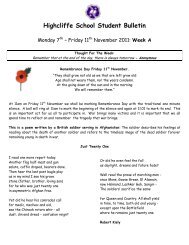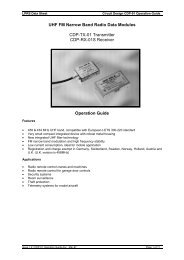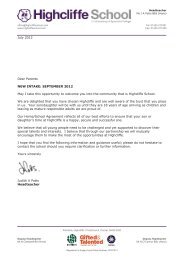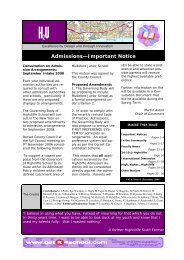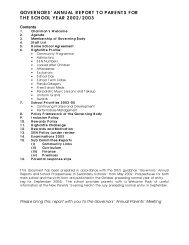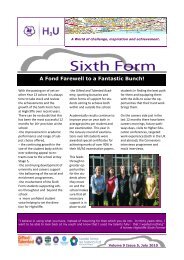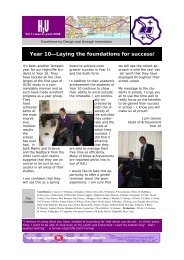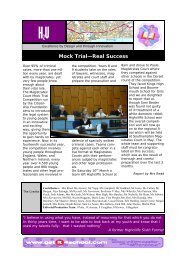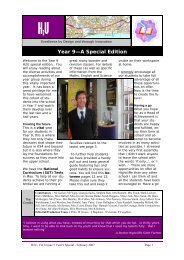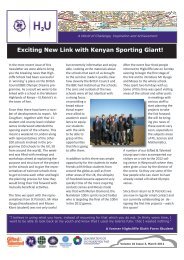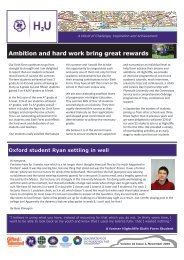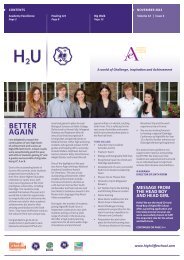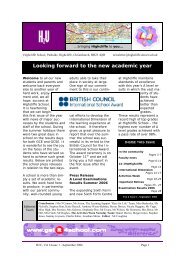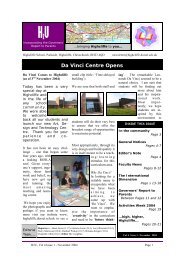H2U Vol 7 Issue 3 Jan 2008.pub - Highcliffe School
H2U Vol 7 Issue 3 Jan 2008.pub - Highcliffe School
H2U Vol 7 Issue 3 Jan 2008.pub - Highcliffe School
You also want an ePaper? Increase the reach of your titles
YUMPU automatically turns print PDFs into web optimized ePapers that Google loves.
Enterprise Challenge cup.<br />
You can read about their<br />
experience at the Regional<br />
finals in the box.<br />
Year 9 Geography and<br />
Social Enterprise<br />
Last term Year 9 Geography<br />
students learned about<br />
Development. Covering<br />
the differences between<br />
MEDCs and LEDCs – or<br />
More Economically Developed<br />
Countries and Less<br />
Economically Developed<br />
Countries. We also looked<br />
at the difference between<br />
relative and absolute poverty,<br />
the benefits of world<br />
trade and problems of<br />
globalisation, and the reasons<br />
behind the trade gap<br />
between poor and rich<br />
countries.<br />
The unit also studied the<br />
Millennium Development<br />
Goals set in the year 2000<br />
by nearly 200 countries<br />
round the world in an effort<br />
to make the world a better<br />
place. Year 9’s looked at<br />
the progress and limits being<br />
made regarding issues<br />
such as infant mortality, literacy<br />
rates, maternal health<br />
and<br />
combatingseriousdiseases<br />
such<br />
as<br />
HIV<br />
and<br />
malaria.<br />
The Trading Game was a<br />
way to reflect on the unit as<br />
a whole and coincided with<br />
Enterprise Week – with a focus<br />
on Social Enterprise.<br />
The world economy is a<br />
hugely complicated balancing<br />
act, controlling more or<br />
else everything in the<br />
world. A system where<br />
making the right decision<br />
means the difference between<br />
financial security or<br />
misery for millions. The<br />
aim was to<br />
highlight how<br />
some countries<br />
will remain<br />
poor if<br />
the richer<br />
countries do<br />
not take<br />
some responsibility<br />
to<br />
make<br />
changes for<br />
humanitarian<br />
reasons rather than ones<br />
based on profit.<br />
The Trading Game<br />
The aim of the game is to<br />
make money by producing,<br />
Trading Game—Student Responses<br />
‘By playing the Trading Game I learnt a lot about how countries have to<br />
struggle on what the resources they have. I noticed that many of the<br />
countries were deprived of the basic needs to make the shapes. The<br />
Game was trying to show us how hard it was for some countries to get by<br />
with what they had. The team I was with was Malaysia and all we had to<br />
start off with was paper and £200. We traded our paper and money for<br />
resources. The changes to the value of shapes was annoying at times and<br />
we were not very successful, the highest amount of money we cashed in<br />
was £300, but by the end we only had £100 due to being fined.‘<br />
By Kathryn Marks<br />
‘The Trading Game was a fun yet educational activity which taught us<br />
about the world’s economic system but in an interesting way. I was in<br />
the winning team of Tanzania. We were quite a poor country and we only<br />
started with one pencil, one piece of paper and £200. We had to trade<br />
what little we had to get the right equipment to make the various shapes<br />
and then cash them in at the World Bank. We were good at trading with<br />
other countries and we managed to get our country out of poverty and<br />
further up the economic system.’<br />
By Lewis Payne<br />
Page 6 <strong>H2U</strong>, <strong>Vol</strong> 7 <strong>Issue</strong> 3 - <strong>Jan</strong>uary 2008



